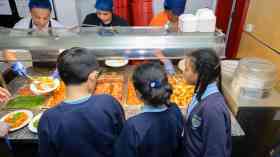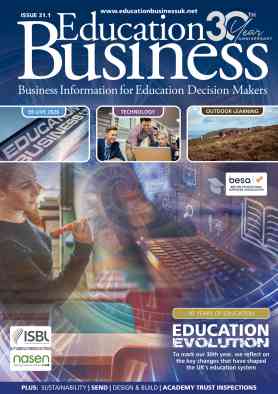Maintaining a nurturing education environment
 The traditional view of the facilities manager (FM) in a school or college has been primarily as a caretaker, keeping the site in top condition to support the teaching and learning. A recent online review of job descriptions for FM posts in a range of educational establishments revealed a requirement for a wide set of skills and attributes that the most experienced superhero would be proud of. They need to be able to lead the efficient delivery of day-to-day services. But they also need to play a strategic role, contributing to business objectives, with a broad knowledge of procurement, contract and project management, health and safety, emergency planning, and financial management. They need to be strong communicators, skilled negotiators, and technology savvy, and the list goes on.
The traditional view of the facilities manager (FM) in a school or college has been primarily as a caretaker, keeping the site in top condition to support the teaching and learning. A recent online review of job descriptions for FM posts in a range of educational establishments revealed a requirement for a wide set of skills and attributes that the most experienced superhero would be proud of. They need to be able to lead the efficient delivery of day-to-day services. But they also need to play a strategic role, contributing to business objectives, with a broad knowledge of procurement, contract and project management, health and safety, emergency planning, and financial management. They need to be strong communicators, skilled negotiators, and technology savvy, and the list goes on.
There is now clear evidence of true partnerships between the academic, financial and facilities staff. In a time of decreasing budgets, this is essential to add value and meet heightened customer expectation.
For higher education establishments and universities, in particular, increased competition has driven improved standards of student facilities, with the recognition that well-managed facilities with high quality, value-added services can offer the opportunity for vital income generation.
Top of the agenda
In April, the British Institute of Facilities Management’s (BIFM) newly-revamped Education Special Interest Group (SIG) held a key event at the 128-acre Cobham Campus of ACS International Schools, which is home to 1,500 children aged two to 18. BIFM committee member and FM/projects manager for ACS International Schools Oren Gershon hosted the networking meeting, attended by more than 50 facilities professionals in the education sector, from bursars and estates managers to head of schools.
Other speakers included Phil Dunne, from technology specialist Service Works Group, whose computer-aided facilities management application, QFM, is used at the school. Greg Davies from health and safety consultancy Assurity Consulting also spoke on the role of promoting a positive health and safety culture within school environments, and the need for competent support and viable information in demonstrating it.
The value of the FM team was placed firmly at the top of the agenda by ACS International School’s headmaster Tony Eysele, who opened the event by highlighting the importance of FM in the campus experience, said: “Without our facilities team, the school cannot operate. Too often parents forget that. They just see the classroom and teacher and don’t consider the work that goes on behind the scenes to keep the campus operating smoothly and looking so good.”
Latest thinking suggests that the physical environment in academic buildings has a direct influence on academic work, the nature of the community, and the culture that exists within it, ‘transforming space into place’ and contributing to sustainability goals.
Oren Gershon, and around 110 facilities staff, support the residential campus and all aspects of childhood development – sports, arts, academic and a home life: “I recognised that I could make a real difference within a school by creating the best possible learning environment for students.”
Since joining two years ago, Gershon has overseen a transformation in the performance of the facilities team, which provides most services in-house. He has introduced service level agreements and key performance indicators so that they understand the quality of service expected of them, and has generally taken a professional and commercial approach to service excellence. The site is an official training ground for the 2015 Rugby World Cup and was approved as a pre-training camp for the 2012 Olympics.
Customer service
The in-house team includes landscapers, cleaning, catering and security staff, engineers, caretakers, and maintenance engineers. They deal with around 600 helpdesk calls and 30 events each month and serve 13,500 organic and locally-sourced meals every week, for which they have won a Food for Life Award two years running. Green university rankings are growing in prominence and the FM service provider can play a major role in helping to meet sustainability objectives.
Customer service is a key aspect of any facility manager’s role. The need to ensure an excellent customer experience, coupled with the demand for, and dramatic growth in, FM software solutions, is transforming the way stakeholders expect to interact with facilities departments. Technology has enabled a dedicated customer-focused service which can act as the central point for university staff to make enquiries, report faults and request maintenance, and is essential for effective scheduling of routine and maintenance works at the most appropriate and economically viable time. Gershon’s CAFM system, QFM, which the school purchased two years ago, is enabling him to be more prepared for planned and preventative maintenance, ensuring the students are not disrupted by non-essential maintenance and capital works.
Gershon is helping to raise the bar in FM and to encourage young talent into the industry. He has introduced FM as a career option to interested students, supporting them with their coursework through practical studies of the facilities. Light levels were changed in the dining room, for example, and students’ mood levels monitored, before and after the change, to demonstrate how light affects emotions and productivity.
Jayne Townsend, chair of the BIFM Education SIG, and estate and maintenance services manager (hard FM) at the University of Sussex, mirrored the strong message of nurturing the student and supporting their well-being through a quality built environment: “We provide facilities so our clients, the students, can learn in the best possible environment to help them get the best out of their university experience.” A message which resonated with all of the education FMs present at the event.
Further information
www.bifm.org.uk
Latest News
30/01/2026 - 10:20
Ordnance Survey (OS) is offering its free education resource for the teaching of geography to 1,800 primary and secondary schools in some of the most deprived areas of Great Britain.
29/01/2026 - 10:37
The Education Business Awards recognise the leadership, innovation, operational decisions and strategic planning that help schools run more effectively and deliver better environments for both staff and pupils.
29/01/2026 - 10:26
The Education and Work and Pensions Committees have launched a joint inquiry investigating how the Government’s new Child Poverty Strategy, announced last month, can meet its aims.
29/01/2026 - 09:23
Charity School Food Matters has released learnings from its school food improvement programme, Nourish, and has formed a roadmap to success for school food policy.
28/01/2026 - 09:57
Multi-academy trusts are increasingly turning to artificial intelligence to support teaching, learning and school management, but evidence of its impact remains limited, according to new research from the Education Policy Institute (EPI).







